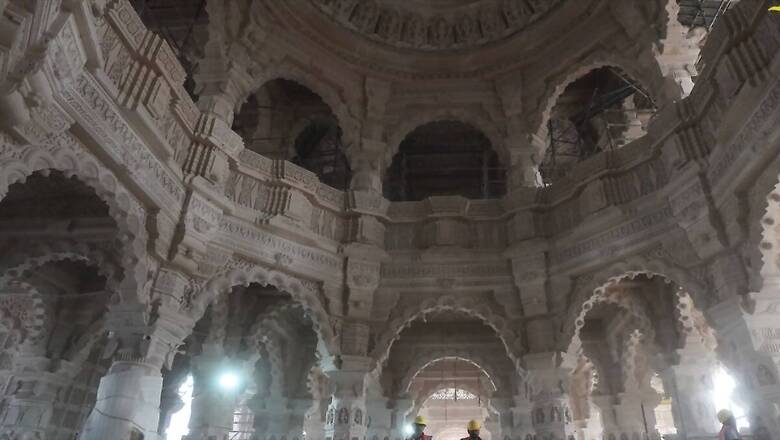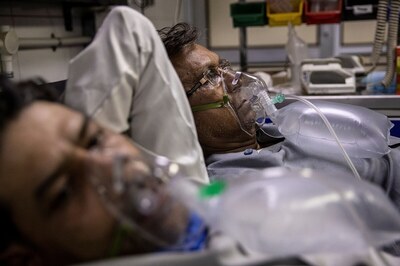
views
Air tactical aerostat system, Artificial Intelligence (AI)-powered facial recognition cameras, long-range aerostat cameras, upped riverine security and special AI-powered alarm system programmed to sound alert on intrusion of any suspected boats – these and more systems have been deployed in air, water and on land to ensure safety of devotees visiting the newly built Ram Temple in Uttar Pradesh’s Ayodhya.
The temple will open to public after the high-profile consecration ceremony on January 22, 2024. The UP government recently deployed special security forces in Ayodhya.
In an exclusive interview to News18, Praveen Kumar, Inspector General of Police (IGP), Ayodhya Range, said that the security plan would be a perfect example of “collaborative intelligence – an amalgamation of the human as well as artificial intelligence — to handle the increasing footfall on Ram Bhakts". “The new security plan aims to help tourists while providing them with top-notch security. The updated security plan will be implemented from January 14, 2024," said Kumar.
HERE’S THE PLAN: FOR AIR
“Ayodhya has always been a hypersensitive zone. Keeping the sensitivity in mind, there was a need for an elaborate plan to provide adequate security in the present era of technological advancements and cybercrime. There was a need for collaborative intelligence…," Kumar said.
Kumar said the security has been designed to cover the threats from air, water and land. “For air threats, we have installed an air tactical aerostat system which is designed to perform aerial intelligence, surveillance and reconnaissance. It can also be used to carry out surveillance of the border areas of Ayodhya," he said.
Additionally, he said they also have AI-powered anti-drone solutions that would not only keep a check on possibilities of any attack from a drone, but also have the capacity to detect, track, identify, classify and neutralise drones at a distance of several kilometers. “We have also installed an advanced long-range aerostat camera that is designed to keep a watch on the bordering areas of Ayodhya," Kumar told News18.
#WATCH | Hindu Americans in the Washington, DC area organized a mini car and bike rally at a local Hindu Temple, Shri Bhakta Anjaneya Temple in the street 'Ayodhya Way' to celebrate the upcoming Pran Pratishtha' at the Ayodhya Ram Temple pic.twitter.com/6EQQ1yHHwp— ANI (@ANI) December 16, 2023
HANDLING WATER ‘BODIES’
“Located on the banks of River Saryu, a major part of Ayodhya is surrounded by water. So there was a need for a foolproof water security system. We have also installed high-definition cameras and an AI-powered system that is programmed to raise alarm in case of any intrusion or on spotting any suspicious boat or activity in water. This part of the upped riverine security," Kumar added.
ON LAND
On handling threats on land, Kumar said: “One part of the security plan covers the temple structure and the second covers the areas and roads leading to the temple," he added.
Other than the deployment of forces such as the Central Reserve Police Force (CRPF), Provincial Armed Constabulary (PAC) and UP Special Security Forces (UPSSF), Kumar said the UP Police has installed AI-powered facial recognition-enabled CCTV cameras across the city.
“It is perhaps the first time that AI-powered cameras are being installed in UP. These special surveillance cameras are programmed to carry out ‘people search’, predicated on descriptive details such as gender, age, height, categories, man, boy, child, elderly and body dimensions."
He said the system will also be able to match people’s faces with that of police sketches and databases. Officials said the technology would help with early identification of the suspect.
Shri Ram Janmabhoomi Mandir first floor – Construction Progress.श्री राम जन्मभूमि मंदिर प्रथम तल – निर्माण की वर्तमान स्थिति pic.twitter.com/iYqveMeUcZ
— Shri Ram Janmbhoomi Teerth Kshetra (@ShriRamTeerth) December 15, 2023
THE TEMPLE SECURITY
Until now, the area of the Ram temple was limited, which meant the three-tier security system was sufficient. However, the recent expansion and development of Ram Temple necessitated an updated plan to cover the entire area. “Initially, there was only entry and one exit, but now the temple has multiple exit and entry points, with at least ‘four paths’ leading to the temple. It also has new gates, public facilitation center and baggage scanners. Hence, many new strategic points and check posts have been established for deployment of forces," he said.
BEHAVIOUR MANAGEMENT
Kumar said special training has been imparted to the UPSSF and other forces. “Our main aim is to train them to handle the anticipated crowd and ensure safety to devotees," he added.
The deployment of the UPSSF and the implementation of the new security system was done on the directions of UP Chief Minister Yogi Adityanath who recently visited Ayodhya to review the ongoing progress of Ram Temple work.
NO DARSHAN FOR PUBLIC ON JANUARY 21 AND 22
“An elaborate traffic diversion has been chalked out to facilitate movement of VVIPS ahead of the consecration. The temple will be closed for common public on January 21 and 22. On these two days, the entire temple area will be sanitised," he said.




















Comments
0 comment